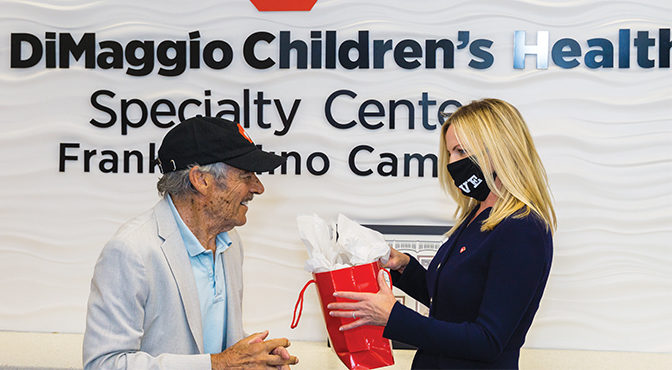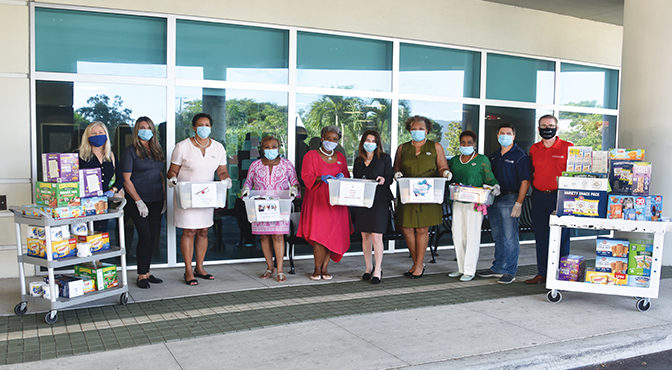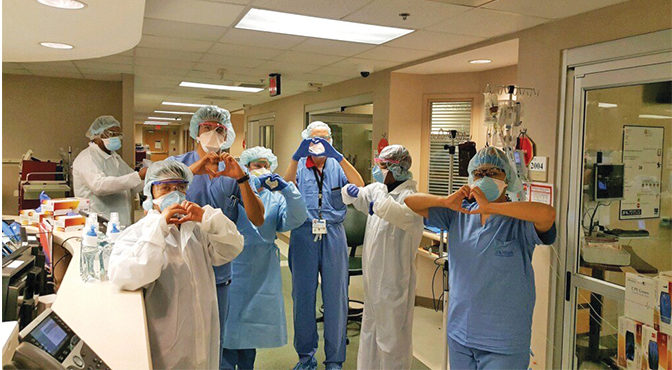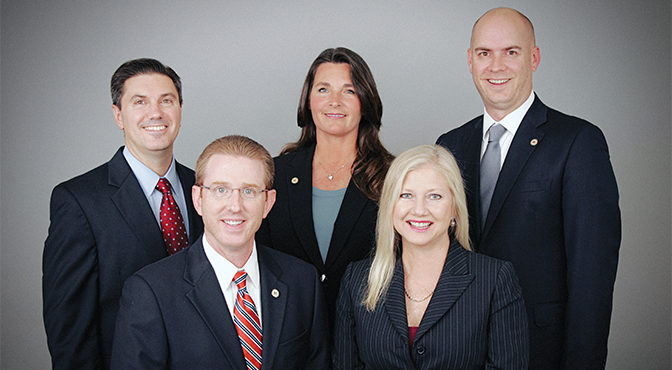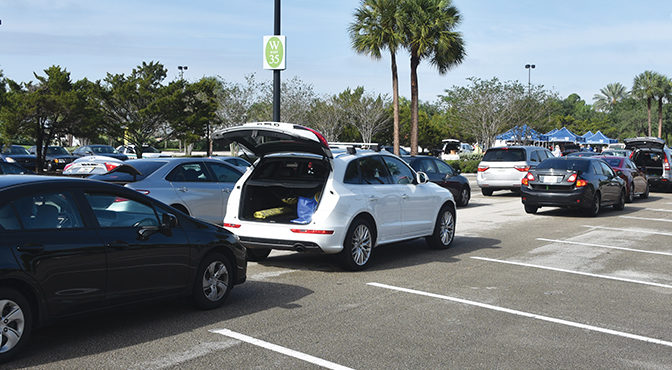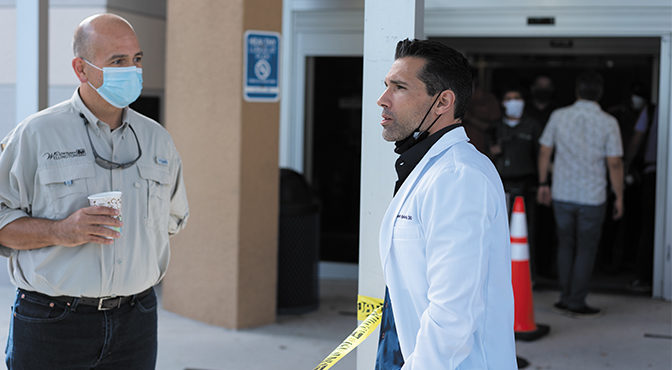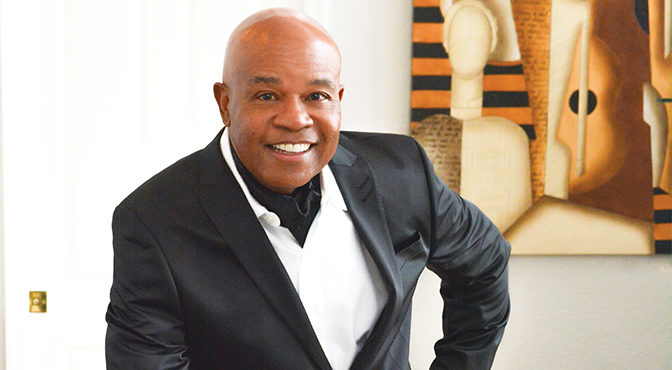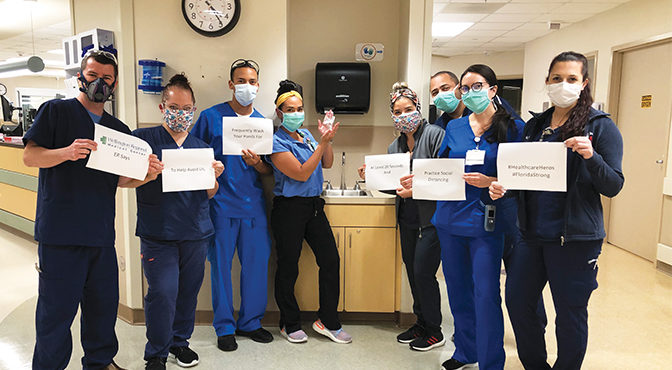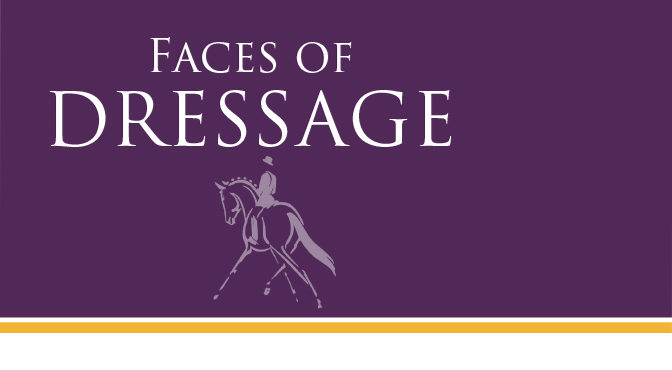Wellington Q&A: The Village Updates Residents Regarding The Virus Pandemic
COVID-19 Response
As our community begins to recover from the COVID-19 pandemic, Wellington The Magazine invited Wellington officials to participate in a question-and-answer session regarding the village’s response to the virus emergency.
How did the Village of Wellington become informed about the possibility of a pandemic due to COVID-19?
Wellington received notification through the Centers for Disease Control & Prevention health advisory on Jan. 9 of an outbreak in Wuhan, China. Since that notification, Village Emergency Operations staff has been closely monitoring the pandemic. Following Gov. Ron DeSantis’ issuance of Executive Order 20-51 on March 1, directing the Florida Department of Health to issue a public health emergency, Wellington activated its Emergency Operations Center with monitoring on March 4. Wellington’s call center activated its COVID-19 assistance information on March 16. Full EOC activation occurred when Wellington declared its Emergency Order Number 1 on March 26. “Once we became aware of the thread of the virus, the village began taking several steps to both be prepared to coordinate and communicate with county and state health officials, and ensure the health of our community and the continuity of critical operations of village government,” Wellington’s Director of Emergency Management and Public Safety Nicole Coates said.
What were the responses that the village took to address residents’ safety during the pandemic?
Wellington activated its Emergency Operations Center and established an incident management structure to optimize the coordination of public health and safety strategies for village residents. The village’s response included preparation, prevention and mitigation strategies to limit the spread of infection, such as canceling public gatherings and events. Officials evaluated critical services to maintain continuity of government, such as solid waste and wastewater operations. The village further ensured that all public facilities were sanitized in accordance with CDC guidelines and implemented an enhanced disinfection plan.
Since early March, the village has been providing COVID-19 information and updates to residents and business owners. Wellington’s COVID-19 web pages and links provide extensive information regarding updates, videos and resources for residents, businesses and the equestrian community. “Keeping our residents informed is essential to minimize the health effects of a pandemic,” Village Manager Paul Schofield said. “The village’s public information office and call center have communicated measures that the public can take to minimize risk and decrease the spread of infection.”
How and when did the village decide to cancel public activities and shut municipal facilities? What criteria were used to determine when it was safe to re-open?
During the week of March 9, the village started discussions on canceling programs and activities. To protect the most vulnerable populations, senior activities were canceled first. The Community Services Department reached out to all seniors who were signed up for upcoming programs and events and informed them of the cancellations. The Wellington Seniors Club helped by mailing out an emergency newsletter to let their members know about the cancellations of the programs and upcoming events.
Soon after, all other programs and events were canceled. Updates were shared through social media, media releases, e-newsletters, e-mails to participants and information was shared on Wellington’s web site. The village continues to work closely with officials from the Florida Department of Health, Palm Beach County and the State of Florida to review the data and benchmarks for the safe re-opening of village facilities.
“The vital role that parks, recreational facilities and programming play is even more evident during challenging times, including the situation the entire world finds itself in now,” Parks & Recreation Director Eric Juckett said. “While we had to make some difficult decisions to close many of our parks and facilities, our focus remained on offering programming to help keep our residents active and healthy.”
What did village staff do during the height of the pandemic? Were any staff members furloughed? How many were working from home?
The Wellington Village Council, the village manager and senior staff advised employees of the village’s commitment to support them throughout the pandemic from the very beginning. A majority of village employees have worked together through multiple events, including hurricanes and previous potential pandemic events. The village enacted its emergency operations protocols in early March. This structure gives clear direction to employees and each department as to their responsibilities and plans. However, some village departments started preparations in early February based on world news and the need for additional supplies and different planning.
Executive orders and CDC guidance served as the basis for decisions. No employees were furloughed. Some staff was reassigned to other departments. For example, two Parks & Recreation staff members were assigned to help the Public Information & Communications Department. Approximately one-third of all full-time employees telecommuted and worked from home and are continuing to do so. The remaining employees separated to comply with social distancing and split into teams or shifts that rotate schedules to prevent an entire department from potential exposure.
“These protocols — telecommuting, social distancing, physical relocation, rotating schedules and working in teams — have been very successful. Wellington has continued to perform all work and deliver essential services while village facilities remained closed to the public,” Deputy Village Manager Tanya Quickel said. “We give special thanks to our Building Maintenance and Public Works departments, who take such good care of our residents, our employees and our facilities. They go above and beyond to take all precautions and work diligently in cleaning and implementing preventative measures throughout the village.”
What was the village’s role in the closure of non-essential businesses? What did the village do to ease this transition?
Essential and non-essential businesses were defined by state executive orders and further defined by Palm Beach County executive orders. The village followed direction from the governor’s office regarding business closures and worked with businesses to make sure they understood these orders. Wellington continued to monitor the businesses with respect to whether they were open or closed and posted a list of open restaurants with locations and contact information, along with operational status (i.e.: takeout, delivery, curbside service) on Wellington’s web site.
Wellington continues to communicate with the local business community. Most recently, Wellington launched its Voluntary Business Compliance Inspection program to recognize local businesses complying with Gov. DeSantis’ COVID-19 guidelines for re-opening. The goal of the program is to help promote safety and consumer confidence. “Our local businesses are the lifeblood of our community,” Planning, Zoning & Building Director Tim Stillings said. “We are doing everything in our power to help guide them through this unprecedented time. From visiting businesses to inform them about new executive orders to sharing resources and helping them develop alternative ways to serve their customers, we continue to be there for our business community to let them know we support them.”
What special initiatives did the village become involved with during the height of the pandemic?
Wellington has become involved in a wide array of community initiatives during this virus emergency. For example, while in-person events and recreational programming are on hold, Wellington’s Parks & Recreation team created virtual programming live via Zoom and through its Virtual Recreation Center. Virtual programming includes a variety of free instructor-led classes, at-home activities, updates and ideas to keep residents of all ages healthy, entertained and informed.
Wellington has also provided special relief and assistance for vulnerable populations. Anticipating financial hardships associated with the closure of businesses and loss of jobs, Wellington decided early on to temporarily cease disconnects, waive late fees and to work with customers with payment plans. The Senior Services team continues to provide older residents information and referral assistance on programs and services available to meet their needs. The village expanded its Senior Transportation and Rides (STAR) program to include free, unlimited grocery store and prescription pickup and delivery. “From teacher parades to joining forces with first responders for surprise drive-by birthday celebrations to celebrating National Hospital Week with a car parade at Wellington Regional Medical Center, to daily neighborhood outreach, we continue to come up with creative ways to engage our residents and maintain a sense of community during this challenging time,” Mayor Anne Gerwig said.
Tell us more about the food distribution event now held each Tuesday at the Mall at Wellington Green. How did this come about, and how long do you expect it to continue?
The village is working with Feeding South Florida to provide meals to families every Tuesday at the Mall at Wellington Green. The distribution includes dairy, fruits, vegetables and protein. Each event provides food for a family of four for approximately one week. The village will continue the food distribution events as long as there continues to be a need during the COVID-19 crisis. “We are all feeling the economic impacts of the coronavirus; many of our families have been affected. Some of these families are struggling to put food on the table, and we are always looking for ways to help. Wellington is proud to support Feeding South Florida’s mission to respond to the COVID-19 crisis and the increased food needs in our western communities,” General Services Director Ed De La Vega said.
Tell us about the village’s involvement with the COVID-19 testing site at Village Park in collaboration with Premier Family Health? How did this come about?
Wellington partnered with Palm Beach County and Premier Family Health to set up a testing site to serve the western communities. The Village Park gymnasium was sectioned off for the test site and approximately 2,000 test kits were provided for free testing. The test site could process up to 320 appointments per day, including scheduled and walk-ups. The testing started May 13 and ended May 29. “Premier Family Health was instrumental in the success of the COVID testing site in Wellington,” Director of Human Resources Kim Gibbons said. “Dr. Vincent Apicella and the Premier Health team of more than 15 staff members arrived each day to work with everyone, providing information and reassurance during this difficult time.”
Testing is a critical part of getting the community back to normal, Assistant Village Manager Jim Barnes added. “Collaborating with Palm Beach County and Premier Family Health allowed us to bring testing closer to the western communities and offer this free resource for our residents,” Barnes said. “When we look back at what will be the first wave of COVID-19, testing data will be an important piece of the puzzle for stopping or slowing the disease in the future.”
What has the village learned during this unprecedented pandemic?
The village expanded its use of technology to continue delivering services to residents. From additional call center staffing to changes in online contact options, using technology to allow village staff to work with residents from home, it became clear that Wellington can provide cost-effective and professional service to residents remotely. Changing the service model to include community partners such as Feeding South Florida, the Crowned Pearls of Wellington, the Wellington Rotary Club and Premier Family Health allowed us to adapt to new demands and continue to provide the level of service that residents expect. “Wellington stepped up to every challenge, from assisting seniors with food and pharmaceutical deliveries to partnering with Palm Beach County and Premier Family Health to establish a local test site, to working with Feeding South Florida on ongoing food distributions,” Councilman Michael Napoleone said. “Wellington is there to work out a solid solution.”
What steps has the village taken to ensure a stronger position in the event of a resurgence of this virus in the future, as some predict?
The village continues to communicate updates regarding COVID-19. The community is not in the clear yet, and health officials have predicted this to come back in the late fall. We continue to share CDC guidelines, Palm Beach County and village updates on social media, the village web site, e-newsletters and media releases. The village is committed to following the CDC guidelines and requires that those who enter Wellington buildings wear facial coverings. Staff has been using the Zoom platform for conducting meetings, and Wellington continues to promote using its online resources and services. “Taking the lessons we’ve learned in the past months, we will continue focusing on delivering important services to our residents in this ‘new normal.’ Until a vaccine is developed, we will stay vigilant and committed to following all health mandates to keep our community safe,” Councilman John McGovern said.
Do you have a message to Wellington residents during these challenging times?
Wellington will continue doing everything it can to keep residents safe, informed and connected through these unprecedented times. Personal responsibility is the single largest factor in limiting the spread of COVID-19. Everyone knows the right things to do. Remember, precautions are not necessarily about us individually, but rather about our families and our community. Make safety and precautions a priority, follow CDC guidelines and use a bit of everyday common sense to navigate your day.
“All of us here at Village Hall will continue to pay close attention to the impacts of the COVID-19 public health crisis in the coming months,” Vice Mayor Tanya Siskind said. “Whether it be sharing Palm Beach County assistance programs, working with our community partners to offer food distributions and special assistance for our senior residents, opening up more recreation opportunities and more, helping our community get through this is our priority.”
When it comes to interacting with the village, residents are urged to take advantage of online services and stay safe at home. Normal activities like paying your water bill, applying for permits and requesting inspections can all be done with a smartphone, computer or by phone. Speaking of phones, the village is just a phone call away at (561) 791-4000 on Monday through Friday, 8 a.m. to 5 p.m.
“We want our residents to stay healthy and remember to use safety precautions in public,” Councilman Michael Drahos said. “Each of us can make at least a little difference, but working together, we can make a big difference in reducing the spread of COVID-19. Wellington, our great hometown, is getting through this together with our residents.”




